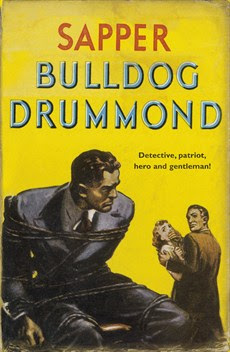In H.C. McNeile’s 1920 adventure novel, Bulldog Drummond, Captain Hugh Drummond, back in England after years in the trenches on the Western Front, finds life in peacetime London boring.
Looking for something interesting, challenging and dangerous to do, he places the following ad in a newspaper:
“Demobilized officer, finding peace incredibly tedious, would welcome diversion. Legitimate, if possible; but crime, if of a comparatively humorous description, no objection. Excitement essential.”
Several responses come in, but the one that intrigues him is from Phyllis Benton, a young woman whose father has fallen into the hands of manipulative criminals.
These bad guys are led by a cunning mastermind called Carl Peterson – which may or may not be his real name – a European gathering a group of agents to disrupt British industry and the government.
McNeile uses Peterson’s plan the way Alfred Hitchcock used his McGuffin. For the director, the word meant the thing the bad guys want which puts the story in gear, but that the audience (in this case the readers) do not care about. The McGuffin in Bulldog Drummond should not be analyzed too closely.
The bad guys are using a mansion close to Phyllis’ home as their base of operations. Drummond takes up the challenge but soon finds he is up against a larger force than expected. To combat Peterson’s henchmen, he calls on his pals who served with him in France. They, like Drummond, jump at the chance for a little action.
As he gathers his troops, Drummond’s friend Algy Longworth tells him, “Toby Sinclair is running round in circles asking for trouble Let’s rope him in.”
Beyond the tongue-in-cheek romp of their adventure, the glimpse of post-war veterans was interesting.
Bulldog Drummond is lightweight stuff. But a lot of it will test a reader’s ability to suspend disbelief. The two wackiest instances are when Drummond discovers a secret room in the bad guys’ headquarters is guarded by a cobra, and when the baddies sick a gorilla on Drummond. These enemies of England spend a lot of time dreaming up bizarre ways to kill Drummond when they could have shot him and dumped his body in the woods.
The character, Bulldog Drummond, has been compared to James Bond. But reading this book, I pictured a younger John Steed, the character played by Patrick Macnee in The Avengers TV series.
Readers today may be offended by the intolerant attitudes of Drummond and his friends. While I picked up the book for a breezy read, there are passages that jumped off the page and made me think we have come a long way in 100 years from the prejudices of the past. But have we?
Herman Cyril McNeile (1888-1937), who wrote under the pen name “Sapper,” turned out this first plus nine more Drummond novels. An additional nine were by other authors. The Bulldog Drummond character was adapted for film, radio and television. McNeile died of cancer at age 48.


